Five Ways to Take Down Liberal Democracies Reminiscent of an Evil Past
As told by the Honourable Justice Robert Beech-Jones.
This is a long article which will be truncated by your email provider. Please read it via Substack.
On 25 October 2024, Justice Robert Beech-Jones delivered the “John Perry Oration”, the annual address hosted by the “Hellenic Lawyers Association”. His speech, “Lawyers and Dictators: Ten Lawyers, and Counting”, examined the ethical challenges lawyers face when confronting “oppressive regimes”.
It was a fitting theme considering Beech-Jones’s history of navigating important ethical challenges relating to oppressive regimes.
In his speech, Beech-Jones recounted the challenges and choices faced by courageous lawyers like Hans Litten, a brash 28-year-old lawyer who subpoenaed and cross-examined Adolf Hitler in 1931 (Litten was executed two years later), South African barristers Sir Sydney Kentridge and Bram Fischer who were punished for fighting court battles against the apartheid regimes, and Demosthenes and Cicero who resisted autocratic forces in ancient Athens and Rome.
The stories of these individuals highlighted the role of lawyers in opposing injustice and the lasting importance of their actions (and sadly in our case: inaction) in defending democratic principles.
He warned his listeners in the introduction to his speech:
“I am sorry but the speech is a bit grim. It is a bit grim because it is meant to be a reflection of our times and, in particular, the threats liberal democracies face, not in this country, or at least not yet, but definitely overseas.
I do not think it is too alarmist to see the slide towards autocracy in countries, including those with strongly established democratic traditions, as deeply disturbing. It is not just the rise of a particular individual or party that is the concern, although that is part of it. What we are witnessing is the success of methods of gaining and exercising power that are reminiscent of an evil past: the harvesting of outrage, grievance, and hate; the denigration of the weak and the vulnerable; the rejection of democratic norms; the perpetuation of lies on a grand scale and the use of violence.” [emphasis added]
On a first reading, Beech-Jones’s comment about the “slide towards autocracy” was seemingly about American politics.
If so, what was striking here was how Beech-Jones seemed strangely oblivious to the Australian experience. His account of how autocrats “gained and exercise[d] power” resembled what happened in Australia starting in 2020. For a shameful period, the political class used “emergency powers”, suspending “democratic norms” to lock healthy populations in their homes to mitigate the alleged risks from a novel virus to the infirm. Those responsible for “exercising power” bypassed regular legislative processes, eroding safeguards for individual rights and freedoms all for “public health”.
No slide to autocracy in Australia though.
Not in our country.
At least not yet.
Despite the official end of the pandemic in 2023, the threat of government overreach continues in Australia under new guises of “won’t someone think of the children!” and the failed (for the present moment) attempt to inoculate the feeble-minded from the perils of State-declared “wrongthink”.
In this article, we reflect on what might be considered the “slide to autocracy” from a learned and important figure in Australia’s COVID-19 story.
As we shall see, the lamentations about the “success of methods of . . . exercising power that are reminiscent of an evil past” are eerily similar with the Australian experience.
We therefore question whether Beech-Jones was trying to tell us something else with his speech.
“The harvesting of outrage, grievance and hate”
The first strategy for “exercising power . . . reminiscent of an evil past” during the pandemic was the “harvesting of outrage, grievance and hate”.
For the most part, it was those who dared question the wisdom of the official narrative, whether it was the lethality of SARS-CoV-2 and COVID-19, or the wisdom of illogical “public health” interventions who were targeted for the grievance, outrage and hate.
For example, imagine going to the beach without wearing a facemask in 2020. It was reported in the legacy media like you were signing your own death warrant!
What about the strange logic of being told by the Police Minister “if you don’t want to be in lockdown, obey the rules”…when the rules were to obey lockdown:1
Or the temerity of the “unvaccinated” nurses who worked while COVID-19 infectious in a Sydney hospital:
Was this different from working while infectious if you were vaccinated?
Presumably yes, it would have been, for reasons unknown.
“At least you had done your bit and gotten ‘vaccinated’!” they would say.
The denigration of the “unvaccinated” was also a feature of the daily propaganda press conferences.
There was NSW’s (then) Premier Gladys Berejiklian:
7 September 2021 - “I wouldn’t want to be in the room with lots of people who aren’t vaccinated” (Source)
13 September 2021 - “I personally don’t want to go into a workplace or a venue where there’s [sic] unvaccinated people.” (Source)
There was Bradley Ronald Hazzard, the former science teacher who became NSW Health’s grumpiest talking-head during the pandemic. He too did much to harvest “outrage, grievance and hate” against the “unvaccinated” in the NSW context:
31 August 2021 - “[A]s I said earlier: get out and get vaccinated. Don’t be so selfish or self-entitled to think you’re different from the rest of us. You’re not.” (Source)
17 January 2022 - “Can I just say to those people who have chosen not to get vaccinated - it’s time to give a damn about someone other than yourself. Give a damn about your community, your family and most particularly, the health staff across New South Wales who you expect to be looking after you, if and when, you end up in our hospital system.” (Source)
In Victoria, Dan Andrews was as enthused about the “vaccine”, emboldened by his die-hard comrades:
5 September 2021 - “We’re going to move from a system where we’ve got everyone locked down to a situation where, to protect the health system, we’re going to lock out people who are not vaccinated and can be . . . This becomes absolutely a pandemic of the unvaccinated and, when we open everything up, it’s not going to be safe for people who are not vaccinated to be roaming around the place spreading the virus.” [emphasis added] (Source)
And who could forget the Northern Territory Chief Minister, Michael Gunner and his crazy-eyed, frothing-at-the-mouth invective directed at the “unvaccinated”:
22 November 2021 - “If you are anti-mandate, you are absolutely anti-vax. If you support, champion, give a green light, give comfort to, support anybody who argues against the vaccine, you are an anti-vaxxer.” (Source)
These are just a select few of the moments where dog-whistles were used to inflame the majority, harvesting outrage, grievance, and hate against the “unvaccinated” to maintain public compliance with extreme and illiberal interventions.
“The denigration of the weak and the vulnerable”
The second strategy for “gaining and exercising power . . . reminiscent of an evil past” was the “denigration of the weak and the vulnerable”.
Though the “unvaccinated” were neither “weak” nor “vulnerable” (quite the contrary!), they were loudly scapegoated by health bureaucrats through their official propaganda channels in the legacy media to unify the majority against a perceived common enemy.2
The scapegoating of the “unvaccinated” was usually a variation on the theme of an allegedly very small minority of the population somehow wielding COVID-19 superpowers, from filling hospital beds (thankfully putting a stop to cringe-worthy dance routines in the wards), to superspreading SARS CoV-2, prolonging the pandemic and cancelling family get-togethers.
Scapegoating the “unvaccinated” served several interrelated purposes:
Manufacturing consent for the extreme interventions in our daily lives (“hit the ‘vaccination’ target and we can all get out of lockdown!”):
“After 114 days of hard lockdown and months of sacrifice and uncertainty, Monday will bring new freedoms and the start of a well-earned celebration for many.” [emphasis added] (Source)
Reinforcing the idea that you “made the right choice” if you got “vaccinated”, both for your own protection and because the “unvaccinated” were such a risk to your own health:
From the above article:
“But healthcare workers here are no longer just fighting a war against coronavirus, they are now battling a never-ending scourge of misinformation about the disease.
Increasingly, the vast majority filling the hospital are severely ill unvaccinated people, some who remain adamant that COVID-19 does not exist even when they are succumbing to the virus.
Others come to the realisation too late that the deadly virus is real, begging for a vaccine before being hooked up to a ventilator, unsure whether they will regain consciousness.” (Source)
Of all the things that didn’t happen during the pandemic, we should remember that they’re stories like these which were the most spectacularly “didn’t” of them all.
Pure propaganda.
Pure fiction.
Well, perhaps not the most “didn’t” after all, but it would be a podium finish with this one:
Back to the story at hand though. Spurious science was usually incorporated to draw conclusions about the risks the “unvaccinated” posed:
And if spurious science could not be drawn on, the opinion of an “Expert” was sufficient for the denigration of the “unvaccinated”:
Deflecting from the failings of government public health policy (“pandemic of the unvaccinated caused hospitals to become overrun”).
For example, the “overworked doctors and nurses” who had to “dig deep” to “find compassion” for “unvaccinated” patients:
By late 2021, COVID-19 was rampant among the “fully vaccinated”, exposing the myth that the hospital crisis was solely caused by the “unvaccinated”.
If hospitals were overrun due to the “unvaccinated” earlier in 2021, how did they withstand the surge in hospitalisations and ICU admissions among the “fully vaccinated” later that year?
The answer is simple: they didn’t.
The narrative blaming the “unvaccinated” for hospital overcrowding was always a lie. It was only after widespread vaccination, when the majority of the population had subjected themselves (or were coerced) to the “vaccine”, that hospitals truly became overwhelmed. The unvaccinated were never the root of the crisis, rather, it was a failure of the promised protection.
As we can see, the “denigration of the weak and vulnerable” served several interrelated purposes during the pandemic, and it too was “reminiscent of an evil past”.
“The rejection of democratic norms”
The third strategy for “exercising power . . . reminiscent of an evil past” was “the rejection of democratic norms”.
It would be hard to imagine a democratic norm that was not tested, bent, or outright broken during the pandemic because of the Reichstag Fire “public health”. Some of these “norms” and how they were rejected include:
The rule of law: laws apply equally to everyone, no matter how powerful or rich they are:
Freedom of speech: people can express their opinions without fear of punishment, even if they criticise the government;
Accountability and transparency: government officials and their decisions are open to scrutiny from the public:
Respect for rights: everyone’s basic rights—like freedom of religion, assembly, movement, work and bodily autonomy —are protected;
The closure of places of worship and their impact on Catholics, Muslims, and over $35,000 in fines given to those who defied “public health orders” to attend church;
Coercive “vaccine” mandates in Australia violating the fundamental principle of informed consent: consent must be given voluntarily;
Violating the human right to work by barring individuals from employment based on their vaccination status, forcing many to choose between their livelihoods and personal medical decisions; and,
The world’s longest cumulative lockdown in Melbourne (totalling 262 days across six separate periods).
The list goes on and we have captured but a few of the major stories here.
We learned during the pandemic that “democratic norms” could be rejected if someone uttered the phrase “public health emergency”. Doing so paved the way for all manner of illiberal interventions in our daily lives, subverting existing legislation protecting individual rights and freedoms; again, reminiscent of an evil past.
“The perpetuation of lies on a grand scale”
The fourth strategy for “exercising power . . . reminiscent of an evil past” was “the perpetuation of lies on a grand scale”.
We could devote an entire series of articles to the lies told about COVID-19 from lockdowns, masks, “vaccines”, DNA contamination of the “vaccines”, the clinical trials, the robust pharmacovigilance, to the excess mortality and so on.
There are too many to quote here and this would distract from the purpose of this article.
So, to reflect on this fourth example of “exercising power” we will leave it to your memory of the pandemic years and instead offer some of the memes we have preserved from this time:
“The use of violence”
The fifth strategy for “exercising power . . . reminiscent of an evil past” during the pandemic was the “the use of violence”.
During the pandemic, police were put in the unenviable position of having to understand, explain and enforce ever-changing health orders as described by the former NSW Police Commissioner Mick Fuller:
“There was a light-level approval process. Brad Hazzard, minister of health at the time, would sign off and ultimately that would empower those orders. Then police had to operationalise those as best as possible . . . It was a challenging time. I don’t feel as though we over-policed, but I totally understand the community disliked the health orders, and police didn’t like them either, to be honest” (Source)
Understandably, this pitted law enforcement against frustrated, anxious, and divided communities. The implementation of excessively rigid and poorly conceived public health policies often resulted in violent clashes, which, while not always instigated by police, became an almost inevitable consequence of the tension and distrust created by such measures.
There are many examples of these violent clashes, the majority of which occurred during the longest lockdowns of 2021. For example:
In August 2021, a video circulated on WhatsApp of a group of men from Western Sydney “resisting” police by simply taking a walk in a group outside on a neighbourhood street:
In September 2021, following the suicide of a construction worker after the shutdown of the construction industry in Melbourne, extreme protests erupted and protestors were fired upon with rubber bullets:
However, on many occasions police used unjustified violence in response to these protests and cases of indiscriminate police brutality were sometimes not prosecuted;
Therefore, the last of the strategies of “exercising power. . . reminiscent of an evil past” being “the use of violence” was the unfortunate outcome of these poorly conceived public health diktats.
The police were the ones who merely had chosen to “follow orders”.
From the evidence presented, it would appear some “followed orders” more enthusiastically than others during the pandemic.
An esoteric reading of the Beech-Jones speech
In the introduction to this article, we raised the question of whether Beech-Jones could be so strangely oblivious to the Australian experience of the pandemic, when the rather large body of evidence freely available to anyone willing to pay any attention, would seem to indicate that the “slide to autocracy” was not unique to countries other than Australia.
Beech-Jones would surely know how it was in Australia.
He is, after all, a very smart man.
So, was he trying to tell us something else in his speech?
An esoteric reading of Beech-Jones’s speech could be interpreted as a subtle commentary on Australia’s pandemic governance. As we have shown, the “emergency powers” and their implementation bore striking similarities to the authoritarian regimes Beech-Jones critiques.
The conclusion to Beech-Jones’s speech provides yet another clue supporting this esoteric reading. In it, he lists the three options the conscientious lawyer has in responding to dictatorships, autocracies and repression:
“[F]irst, going about your business and hoping the unpleasantness will all go away; second, working within an immoral system trying to mitigate its evils and defend its victims; and third, actively opposing and undermining the system from without.”
Did Beech-Jones face these same challenges of “working within an immoral system trying to mitigate its evils and defend its victims”?
Without doubt he did.
In recounting the actions of lawyers like Hans Litten and Sidney Kentridge, Beech-Jones emphasised their choice to work within unjust systems to mitigate harm.
This resonates with his own judgment in Kassam v Hazzard, where he upheld vaccine mandates but framed the decision with limits, noting that forced vaccination would be unreasonable:
“Although it was contended that the impugned orders interfere with a person’s right to bodily integrity and a host of other freedoms, when all is said and done the proper analysis is that the impugned orders curtail freedom of movement which in turn affects a person’s ability to work (and socialise). So far as the right to bodily integrity is concerned, it is not violated as the impugned orders do not authorise the involuntary vaccination of anyone.”3 [emphasis added]
Had the impugned orders authorised the involuntary vaccination of anyone, then they would have been “unreasonable” and the plaintiff’s challenge in this case would have been successful. Though this was perhaps the smallest of victories for the “unvaccinated” and it prevented a safeguard against “forced vaccination” at the time anyhow. Sadly, all it would take is a simple revision of The Public Health Act to remove this safeguard in future pandemics.
Conclusion
As we have shown in this article, the challenges faced by the characters of Beech-Jones’s speech mirror those we face today. The “slide towards autocracy” and political extremism, as Beech-Jones warned, can destabilise and “poison” the courts.
“[M]y simple point is that when a political system starts to break down, its disputes spill over into the courts and eventually poison them.
. . .
An independent judiciary upholding the rule of law on the one hand, and a cruel and dictatorial system as existed under apartheid on the other, cannot co-exist for ever. Ultimately, one has to give.” [emphasis added]
Have we reached that point in Australia yet?
Without proof, it would be alarmist to suggest that we had.
Just as Hans Litten and his cohort probably knew they had little chance of “winning” against Nazism and Adolf Hitler, they pursued the case nevertheless:
“Litten and his cohort did not approach the courts because they had a benevolent view of the Weimer [sic] Republic’s judiciary. They approached those courts because they had nowhere else to go.”
Perhaps our lesson here is that we can understand the limitations of the judiciary working within an autocratic system that can potentially poison the courts.
To that end, when “political extremism takes hold” we are reminded by Beech-Jones not to judge those who have to make decisions within these oppressive systems:
“No doubt judges in similar situations have similar choices to make and, just as tonight I am not judging the lawyers I have talked about, I am not judging them and I would caution others against doing so as well.” [emphasis added]
Beech-Jones pleads with us for amnesty.
The “slide to autocracy” was not, and will not be the fault of the judiciary.
We must be watchful, instead, for political extremism for the reasons outlined in his speech.
We must remember the following:
SBS News, “Sydney anti-lockdown protesters slammed as ‘selfish’ and 'self-entitled' as police vow to make further arrests”, https://www.sbs.com.au/news/article/sydney-anti-lockdown-protesters-slammed-as-selfish-and-self-entitled-as-police-vow-to-make-further-arrests/opj1ize4v, accessed 24 November 2024.
Having personally experienced the mental anguish and intense pressure exerted by family, institutions, employers, friends, and relentless media campaigns, we understand how isolating and harrowing this experience was for many. These individuals, though scapegoated, stood firm under extraordinary conditions, demonstrating a strength that contradicts the narrative of vulnerability projected onto them. These matters aside, to remain “unvaccinated” after this onslaught demonstrates a unique strength and conviction even if it is not immediately recognisable given your experience.
Kassam v Hazzard [2021] NSWSC 1320, [9].








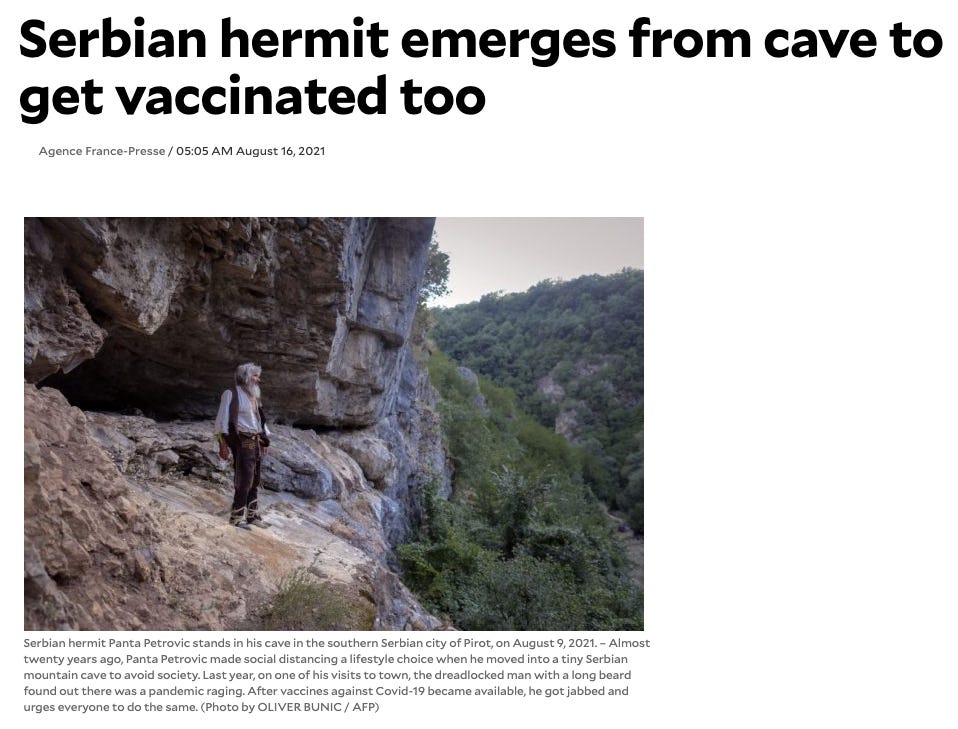




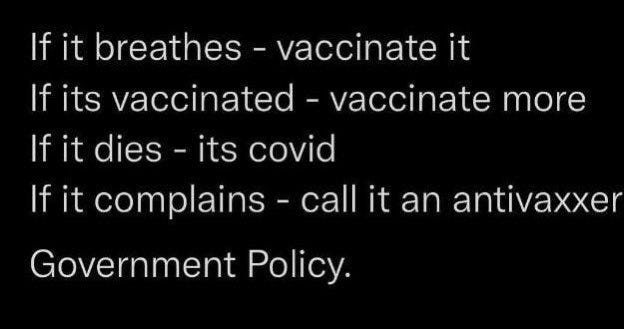
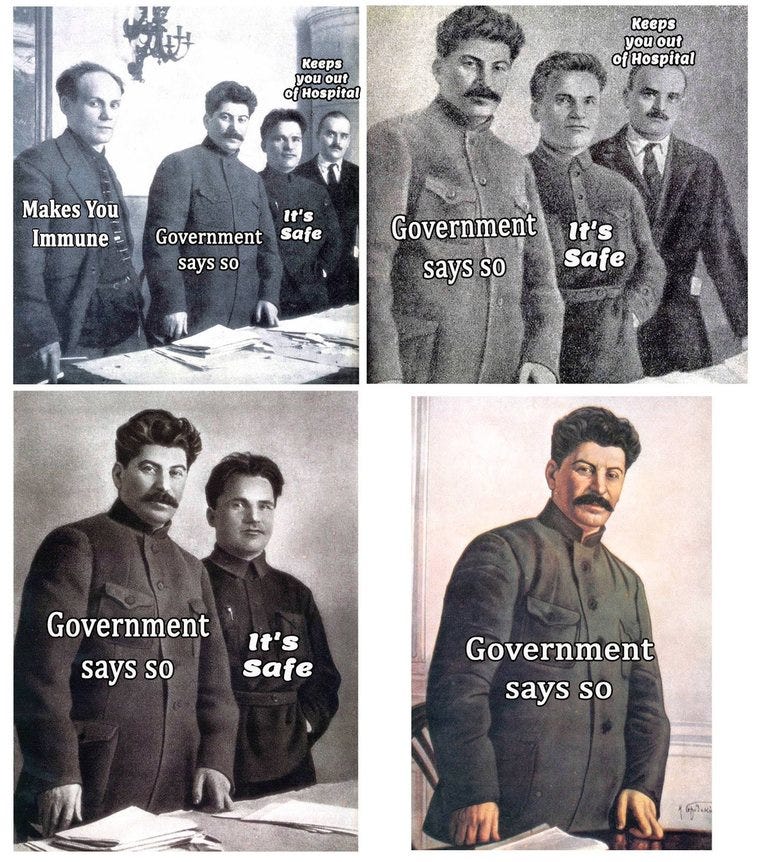
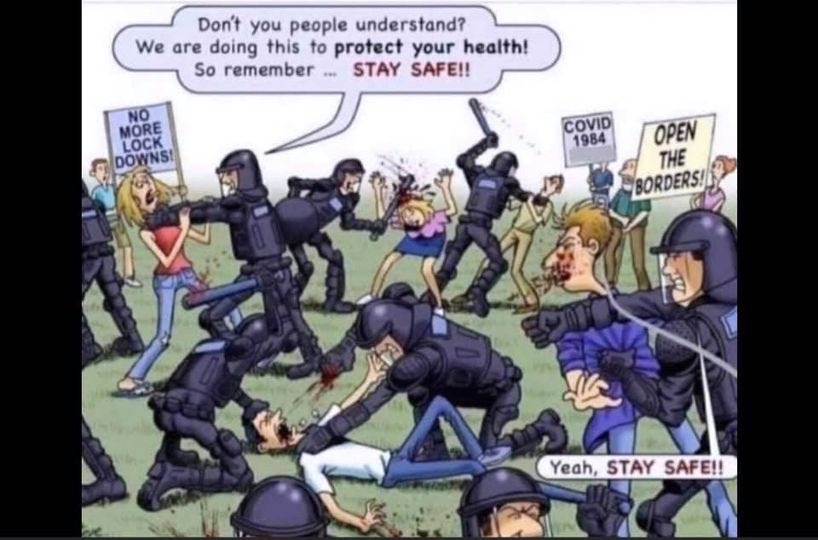
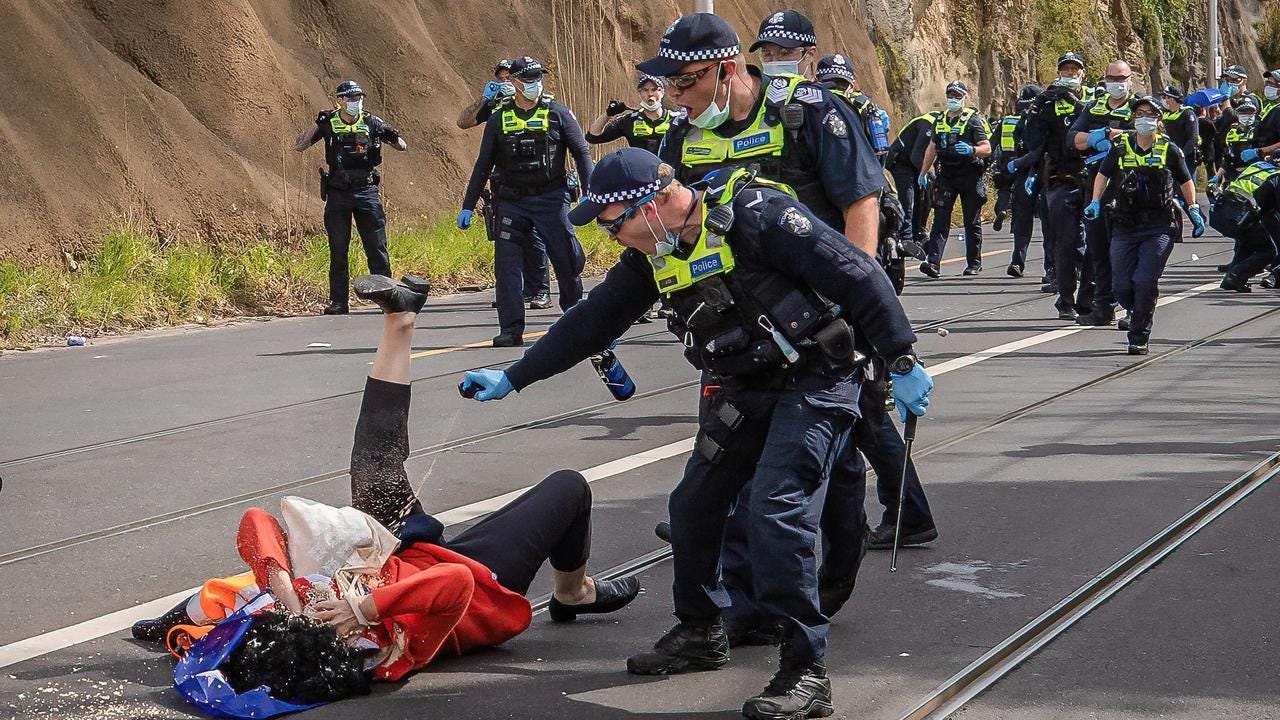

This article should be taught in schools. The complete abuse of human social systems, the economic theft, the brutality was no mistake. In just the same way our nation has the largest natural gas port in the world and we pay nearly the highest price for our own gas. We are being extorted by global mafia.
That meme at the end summed up this atrocity perfectly. Well done Sir !